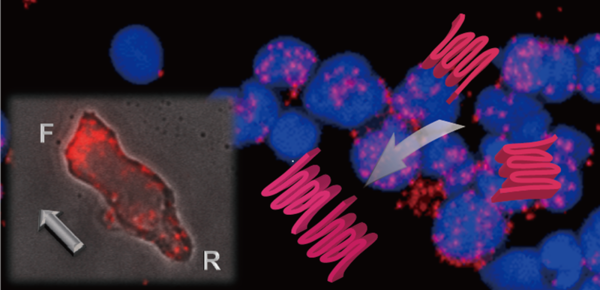A Gear Shift for Cells
2017.09.12
The research group of Dr. Haruko Hayasaka, Department of Life Science, demonstrated that the cell response to chemokines* is regulated by receptor homo-dimerization in immune cells and cancer cells. *Chemokines: Low molecular-weight molecules that bind to their receptors and activate a signaling pathway for cell migration.
Article Title: Regulation of CCR7-dependent cell migration through CCR7 homodimer formation.
Authors: Kobayashi D (Kindai Univ./ Osaka Univ.), Endo M (Kindai Univ.), Ochi H (Kindai Univ.), Hojo H (Osaka Univ.), Miyasaka M (Osaka Univ.), Hayasaka H (Kindai Univ.).
Journal: Scientific Reports
doi:10.1038/s41598-017-09113-4 https://www.nature.com/articles/s41598-017-09113-4
【Summary】
・Homo-dimerization of the chemokine receptor CCR7 is a key mechanism for the efficient cell migration in lymphocytes and cancer cells.
・A novel CCR7-derived synthetic peptide attenuates CCR7-dependent cellular responses
【Backgrounds】
The CCR7 contributes to various physiological and pathological processes, including lymphocyte migration to the lymphoid tissues and cancer metastasis to lymph nodes. Recent studies suggest that the efficacy of receptor-mediated signaling correlates with receptor homo- and hetero-oligomer formation, although the exact extent of contribution of the CCR7 oligomerization to cell migration remains unclear.
【Results】
Hayasaka et. al. assessed the contribution of CCR7 dimerization to CCR7-dependent cell migration and intracellular signaling. Induction of stable CCR7 homo-dimerization by the iDimerize system resulted in an enhanced CCR7-dependent cell migration and CCR7 ligand binding, whereas that of hetero-dimerization between CCR7 and a different chemokine receptor did not. In contrast, dissociation of CCR7 homo-dimerization by a novel CCR7-derived synthetic peptide attenuated CCR7-dependent cellular responses.
【Perspectives】
In this study, Hayasaka et. al. provide new insights into the regulation of CCR7-dependent signaling through CCR7 dimerization. Given that the level of CCR7-dependent signaling is accompanied by CCR7 homo-dimerization in multiple cell types, CCR7-dependent cell migration may be controlled by CCR7 homo-dimerization in various biological contexts, such as metastatic progression in tumors and development of allergic dermatitis. At present, the CCR7-derived peptide is applicable only to in vitro experiments, due to its high hidrophobicity. Future studies are expected to develop modified peptides or chemical compounds that control the molecular equilibrium of CCR7 between monomeric and dimeric states.

